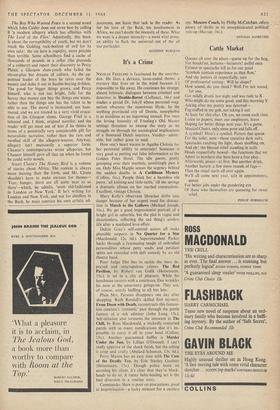It's a Crime
NICOLAS FREELING is fascinated by the unortho- dox. He likes a devious, loose-ended theme, a mystery that lives on in the mind because it's impossible to file away. He continues his strange, almost intimate, dialogues between criminal and detective in Double-Barrel (Gollancz, 16s.) and studies a genial Dr. Jekyll whose personal mag- netism obscures the monstrous Hyde. in the seething provincial city of Drente, xenophobia is as insidious as an ingrowing toenail. For once the loving intensity of Freeling's Old Master settings threatens to swamp the story as we struggle on through the sociological implications of a thousand Dutch interiors. Verdict—admir- able, but rather gone to seed.
How one's heart warms to Agatha Christie for her perennial ability to entertain! Someone is very good at putting out false information at the Golden Palm Hotel. The idle guests, gently gossiping over their martinis, unwittingly pass it on. Only Miss Marple senses the urgency behind the sudden deaths in A Caribbean Mystery (Collins, 16s.). People think her a harmless old pussy, 'all knitting and tittle-tattle,' till she springs a dramatic climax on her startled companions. Excellent, vintage Christie.
Mary Kelly's observant librarian drifts into danger because of her urgent need for distrac- tion in March to the Gallows (Michael Joseph, 16s.). We get a good impressionist portrait of a bright girl in suburbia, but the plot is vague and directionless, reflecting the sad thing's aimless life after a mutilated love-affair.
Dulcie Gray's self-centred actors all make plausible suspects in No Quarter for a Star (Macdonald, 12s. 6d.). Superintendent Parker hacks through a fascinating tangle of unbridled personalities whose petty snubs and petulant spites are recorded with deft comedy by an old theatre hand.
Poor Judge Dee has to tackle the most de- praved and unscrupulous crimes. The Red Pavilion, by Robert van Gulik (Heinemann, I5s.), is set in a city of pleasure. While his henchman cavorts with a courtesan, Dee wrinkles his nose at the unsavoury goings-on. They are, of course, utterly baffling to all but him.
Plain Mrs, Parsons disappears one day after shopping. Ruth Rendall's skilled first mystery, From Doon with Death, reconstructs this feature- less creature's 'romantic' past through the gentle fantasy of a sick admirer (John Long, 15s.). Self-delusion also torments the innocent in The Chill, by Ross Macdonald, a wickedly contorted puzzle with so many ramifications that it's im- possible to carry it all in your head (Collins, 15s.). Another 'guaranteed baffler is Murder Under the Sun, by Lillian O'Donnell. I can't really approve of the shock finish, but the telling is crisp and crafty (Abelard-Schuman, 13s. 6d.).
Perry Mason has an easy time with The Case of the Deadly Toy, by Erie Stanley Gardner (Heinemann, I5s.). Though police insist on accusing his client, it's clear that they're block- heads to do so. A funny baby-lending act is the best diversion in a routine story.
Commander Shaw is poor on precautions, good at improvisation—a lucky mixture for a careless spy. Moscow Coach, by Philip McCutchan, offers plenty of thrills in its unsophisticated political mix-up (Harrap, 16s.).
ANTONIA SANDFORD




























 Previous page
Previous page